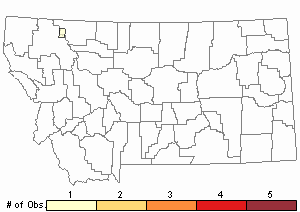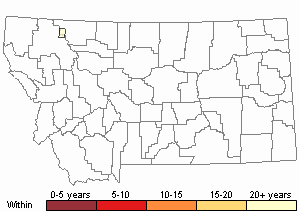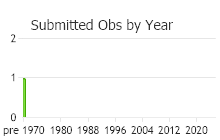View in other NatureServe Network Field Guides
NatureServe
Montana
Utah
Wyoming
Idaho
Wisconsin
British Columbia
South Carolina
Yukon
California
New York
A Dicranum Moss - Dicranum spadiceum
Other Names:
Dicranum angustum
State Rank Reason (see State Rank above)
MT Botanist MIncemoyer downgraded species from S1 to SH for lack of knowledge of specimens after 1972 and was not aware of specimens collected in 1994 from Glacier NP and 1995 from Pine Butte.
General Description
Plants: Acrocarpous, the tufts open to closely packed, green, lime-green or brown, shiny. Stems upright, usually forked above, 2.5-7 cm, densely covered in wooly reddish-brown rhizoids that originate from branch bases on the stem (FNA 2007).
Leaves: Straight, upright-spreading when moist (FNA 2007). Moist and dry plants look similar with no crisping or waviness (Lawton 1971), (4-)5.5-8(-9) mm long, 0.5-1 mm wide. Leaf is concave near the stem and becomes tubular (margins inrolled) towards the tip; the lance-shaped base narrowing into a long, awl-like point (subula); apex acute to occasionally more-or-less obtuse; margins smooth or a little serrate (with teeth that point toward apex) in the upper third; costa extending to apex or slightly beyond, 1/10 – 1/6 the leaf width at base, a little rough or smooth on the abaxial (outer) surface, lacking abaxial ridges, a X-section revealing one line of guide cells and 2 clear stereid bands which run almost to the apex, the epidermal cell layer distinct, seldom several cells of the adaxial (inner) layer enlarged (FNA 2007).
Leaf Cells: Walls of leaf cells bulge little or not at all; laminal cells smooth; alar cells in 2 layers, distinct, not reaching the costa; lower leaf cells are long and have pores that usually connect to an adjacent cell wall; upper leaf cells are somewhat quadrate or longer to unevenly angled and have pores (FNA 2007).
Phenology
Capsules ripen in summer (FNA 2007).
Diagnostic Characteristics
Dicranum muehlenbeckii, closely related to D. spadiceum, differs chiefly in having a wider costa and being larger (Flowers 1973).
Range Comments
Greenland; Canada: AB, BC, MB, NL, NU, ON, QC, SK, YT; USA: AK, CO, MT, UT, WY; Europe; Asia (FNA 2007). In Montana: Flathead, Glacier, and Lake Counties (Elliott 2016).
Observations in Montana Natural Heritage Program Database
Number of Observations: 1
(Click on the following maps and charts to see full sized version)
Map Help and Descriptions
Relative Density

Recency


 (Observations spanning multiple months or years are excluded from time charts)
(Observations spanning multiple months or years are excluded from time charts)
Habitat
Damp soil and rock in alpine areas (Elliott 2016), including fens and lake margins (FNA 2007).
Reproductive Characteristics
Seta single or seldom 2 in a perichaetium, 2.5-3.5 cm, yellow or yellow with reddish hues. Capsule bowed, inclined, grooved when dry, pale to deep brown, 1.5-2.8 mm (FNA 2007).
Stewardship Responsibility
References
- Literature Cited AboveLegend:
 View Online Publication
View Online Publication Elliott, J.C. and A.K. Pipp. 2018. A Checklist of Montana Mosses (1880-2018). Updated 3 January, 2020. Montana Natural Heritage Program, Helena, Montana. 73 pp.
Elliott, J.C. and A.K. Pipp. 2018. A Checklist of Montana Mosses (1880-2018). Updated 3 January, 2020. Montana Natural Heritage Program, Helena, Montana. 73 pp. Flora of North America Editorial Committee, eds. 2007. Flora of North America North of Mexico. Volume 27. Bryophytes: Mosses, Part 1. Oxford University Press, Inc., NY. xxi + 713 pp.
Flora of North America Editorial Committee, eds. 2007. Flora of North America North of Mexico. Volume 27. Bryophytes: Mosses, Part 1. Oxford University Press, Inc., NY. xxi + 713 pp. Lawton, E. 1971. Moss Flora of the Pacific Northwest. Hattori Botanical Laboratory. Japan: Yamabuki-cho, Shinjuku-ku, Tokyo. 362 pages plus appendices.
Lawton, E. 1971. Moss Flora of the Pacific Northwest. Hattori Botanical Laboratory. Japan: Yamabuki-cho, Shinjuku-ku, Tokyo. 362 pages plus appendices.
- Additional ReferencesLegend:
 View Online Publication
View Online Publication
Do you know of a citation we're missing? Elliot, J. C. 1993. Second checklist of Montana mosses. Unpublished report. U.S. Forest Service, Region 1. Missoula, MT. 45 pp.
Elliot, J. C. 1993. Second checklist of Montana mosses. Unpublished report. U.S. Forest Service, Region 1. Missoula, MT. 45 pp. Lawton, E. 1971. Keys for the Identification of the Mosses on the Pacific Northwest. Reprinted from 'Moss Flora of the Pacific Northwest'. Published as Supplement No. 2 of the Journal of the Hattori Botanical Laboratory. Nichinan, Miyazaki, Japan. 66 pp.
Lawton, E. 1971. Keys for the Identification of the Mosses on the Pacific Northwest. Reprinted from 'Moss Flora of the Pacific Northwest'. Published as Supplement No. 2 of the Journal of the Hattori Botanical Laboratory. Nichinan, Miyazaki, Japan. 66 pp.
- Web Search Engines for Articles on "A Dicranum Moss"





